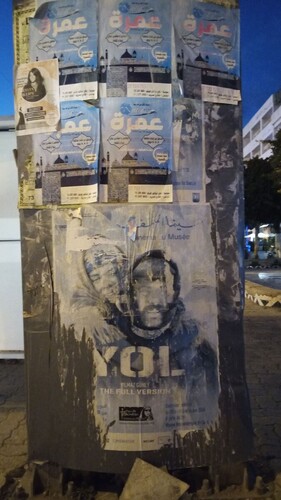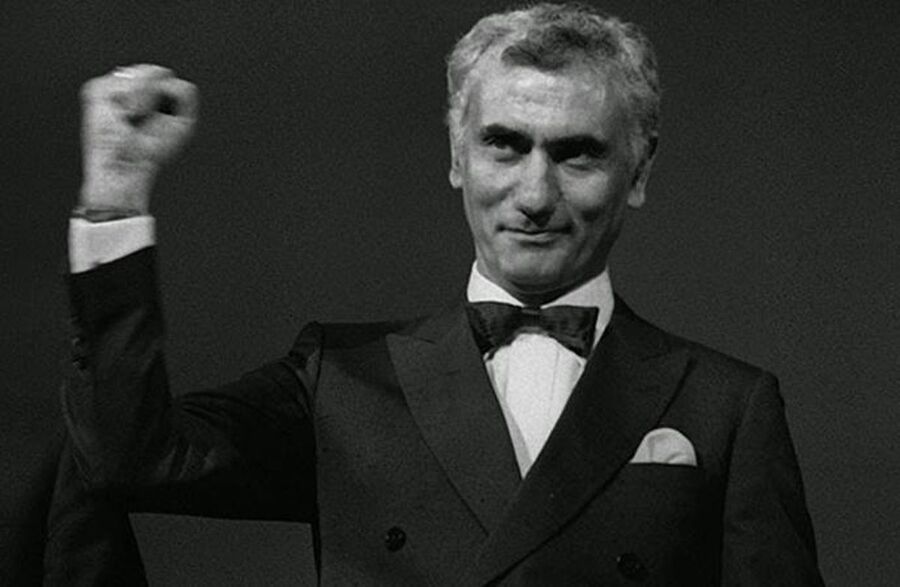Lazgin Ktebchiyan
Who is Yilmaz Goney to us? In order to answer this question, we need to know who is Yilmaz Goney. He is an exiled man. Like most Kurdish people from Kurdistan, he was exiled to Adana. He began to work for producers and directors at the age of 15 to be able to help his family financially. His intelligence interested his "trainers" so they sent him to all parts of the Northern part of Kurdistan to distribute films. He searched for his Kurdish identity and found it, but he did not feel satisfied. He went to Istanbul. First, he studied the world's classic works and began to write stories. He was imprisoned for the first time, not for writing stories but for some troubles he faced in the Magazine he was working for. The prison changed into a school for him. He began to write novels now: Death due to starvation.
Goney was still in prison and after he was exiled again, he was sent to "Konya" this time. He met some Kurds there. The most famous one of them was Michay Kurd. He began to write his scenarios under Micha's guidance and learned Kurdish stories from the people.
However, writing did not interest him very much so he wanted to go back to the colorless world of cinema one more time, because he knew that the only way for him to reach everybody was via cinema. From 1964 to 1967 he directed 60 films and acted as the main character in most of them. Now, everybody knows him, he became the people's king.
One day, the soldiers came to his film setting and took him to military service. He mentioned those two years of military service as: "two stolen years of my life." He did not stop as a military man. Every time he had a chance, he went back to his film setting to finish filming. He became more and more a "political" man. He began his artistic life with some films that sold well so that he could make enough money for his dreams.
He got closer to his goal gradually. The first film via which he clearly shows his Kurdish identity is "Sayitkhan". This film is made to illustrate an opposition to the oppressive government. It shows the uprising of Agri against the government and the smugglers, and finally, he gets exiled. This is one of the first films of Goney with a "political" theme.
Before he made the film Hiwa, he had produced 13 other films. Now, not only in Turkey and Kurdistan but also in many other countries his films have been played and shown. Some of his films were banned and some were censored. It can be said that even his films were exiled. One of his friends took one of his films illegally to Canne city in France. The film did not receive any awards in Canne (because it was brought there illegally) but the film was shown in other places, too, and won awards.
One of his films called "Baba" won the first award of Altin Koza. The award for the best actor was given to a Turkish actor named Cuneyt Arkin.
Remembering his past, he produced a film in Adana. A day after working with some of his friends they went to a casino to celebrate. One of the government's high ranked officers, just to prove his authority, went into that casino and saw that it was crowded for Goney's presence. He asked who he was. He began to quarrel with them. The lights were turned off and shotguns were heard; nobody knows what happened during that time. A day later, the soldiers came to arrest Yilmaz Goney. In 1974, Goney became very famous. Although his brother-in-law said: "I killed that officer", however, it was Goney who was convicted of 18 years of imprisonment.
Goney continued his film production, although he faced many difficulties in prison. He produced his film "The Herd" in prison and "Zakki Oktan" directed it. The main subject of this film is the herds' struggles. He received several awards for this film.
He also published a magazine named Goney in prison in order to distribute his intellectual articles. This made the authorities even more careful about him and they later fabricated more cases for him. Now, he knew he did not have any hope for redemption except escaping the prison. A military coup happened in 1980 just to make everything more complicated. He escaped the prison a year after the coup and went to France.

His sad story of homelessness in France continued for a while. The films he produced after this hard voyage included Yol the scenario of which was written by Goney, and the producer of this film was "Sharif Goran" who became a director in the prison with Goney's encouragement and help. The film is about some prisoners from the Imrali prison. The prisoners are waiting for their few days break to visit their close relatives.
This film of his was banned, too, and once again it was taken to film festivals in illegal ways. It became the best film at the Canne Film Festival. He is known for this film all around the world.
I saw this film's posters in Tunis streets in 2018:
The film was played in Turkey after 12 years while it was censored. The part where it mentions Kurdistan and passes next to the Raha was censored.
His last film is The Wall. It was filmed in an old church in France that represents the prisons in Turkey. The subject of the film is children growing up. It was very meaningful for Goney that he said: "My life in the prison was pure misery and until I did not get rid of it, I would not feel calm." In fact, he produced that film to get the misery out of his system to feel relaxed.
Goney was deprived of his Turkish nationality in 1983. After establishing the Kurdish Institute in Paris in 1984 he presented a speech in that year's Newroz and said: Long Live Kurdistan!
He died in 1984 due to cancer. His body was buried in Pere Lachaise cemetery.
Further references:
1 - Cezalı Delikanlı, Sedat Ulugana, Weşanên Do, 2012
2 - Halkın Sanatçısı Halkın Savaşçısı Yilmaz Güney, H. Yeşil, Dönüşüm Yayınları, 2000
3 - Yılmaz Güney, Ahmet Kahraman, Çiviyazıları,1999
4 - İnsan, Militan ve Sanatçı Yılmaz Güney, Yılmaz Güney, Güney Filimcilik, 1999
5 - Bütün Filmleriyle Yılmaz Güney, Agah Özgüç, Agora Kitaplığı, 2005
6 - Kürt Sineması: Yurtsuzluk, Sınır ve Ölüm, Der. Mizgîn Müjde Arslan, Agora Kitaplığı, 2009
7 - Kürt Yönüyle Yılmaz Güney, Mahmut Baksi, Weşanên Lîs, 2021









